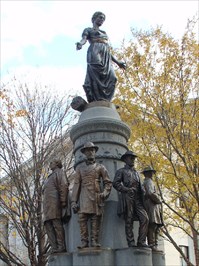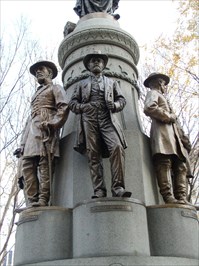Now comes Joseph Becker, who in writing an opinion piece for the
National Law Journal, holds that the "[Tea] Party members' reading of the 10th Amendment to deny broad power to the federal government is without support in legislative history or Supreme Court case law."
The summary is correct. It doesn't. However, there's a flaw in Mr. Becker's logic, as we shall see presently. He begins by citing the response of the First Congress to anti-federalist objections that the Tenth Amendment should deny the federal government all powers not
expressly delegated to it by the Constitution. In the debates, James Madison countered, "it was impossible to confine a Government to the exercise of express powers; there must necessarily be admitted powers by implication."
Mr. Becker continues:
The proposal was rejected. Chief Justice John Marshall, in McCulloch v. Maryland (1819), thought this bit of negative legislative history profoundly significant: It meant that the federal government had implied powers inferable from those actually granted. A wooden reading of the amendment, favored by grand simplifiers of the Tea Party, would not disclose this hidden truth.
A "wooden" reading? Do I detect a hint of bias? Here is what the distinguished New York attorney says about Tea Parties:
The party's affection for the 10th Amendment exudes something else: an aroma, not of tea but of the foul smell of secession. In Texas, the air is particularly heavy with the scent. It is apparently not enough that the calamitous Civil War was fought to put an end to such talk. Nor, it seems, is it significant to that state's current governor that, as a legal proposition, the Constitution prohibits secession: This is an "indestructible union," said the Supreme Court in Texas v. White (1868), a post-War holding that the purported secession by Texas (ironically) was a nullity. The principle is now indubitable.
I'll get to
Texas v. White in a minute.
Mr. Becker continues by citing U.S. Supreme Court Justice Joseph Story in what he called a "dismissive" construction of the Tenth Amendment, quoting the good Justice in 1833 as writing that the amendment "could only 'reserve' that which existed before." A state cannot reserve a power that never existed.
This argument is logically sound, except for one thing. The thirteen original states, Vermont, Texas, Hawaii, and (technically) California, were
de jure independent nations prior to their ratifications of the Constitution. Every state is required as a condition of admission to ratify the Constitution. This is usually done -- as it was in Ohio in November 1802 -- in the form of an ordinance by the new state's Constitutional Convention. This suggests to me that for
every state,
for the brief moment between the adoption of its initial state Constitution and the passage of its ratification ordinance, was de facto
an independent nation, with full sovereignty. In other words,
all the powers that apply to independent nations were "reserved" to the states prior to their ratification of the U.S. Constitution, if only for a brief moment. I am not suggesting here that any state other than those I named above even thought of this (though four of the original thirteen did expressly reserve the right of secession in their ratification statements). Nor am I suggesting that any of them had any desire in that moment to bolt from the union. Nor am I suggesting that they were in any condition to do so if they had tried. But this is a legal discussion, and as a matter of constitutional law and procedure, this appears to be the truth to me.
Mr. Becker closes by pulling out
Texas v. White, a U.S. Supreme Court decision that was written in the heat of Reconstruction, at a time when the United States had completed its
conquest by force of another nation, the Confederate States of America. The Confederate States used the established processes of law to secede; but the unionists wanted to
use the law to cement the military victory. In other words, he who uses
Texas v. White as the basis of an argument against secession is being hypocritical. Why? Because he is asserting on the one hand, that we are a nation of laws, and the Supreme Court is the final interpreter of the law. On the other hand, as I just wrote, he is stating that might makes right. Now which argument should we expect from a professional who has sworn to uphold the law as an officer of the court?
Let me
remind the reader of a contrary argument, made by Judge Harris in the case of
Chancely v. Bailey and Cleveland, 37 Georgia Reports 532 (1868) * While it expresses the minority opinion of that court, I believe it states the truth about the adoption of the U.S. Constitution:
If any prominent advocate of the Federal Constitution had … intimated an opinion, that by ratification of the Federal Constitution, the states surrendered their separate individuality and sovereignty as States, such was the extreme jealousy for the maintenance of State sovereignty, [that] such an opinion… would have led to the prompt and overwhelming rejection of that instrument.
The intent of the framers of the Constitution and of those who attended the conventions to ratify it is quite clear and a matter of public record. They did not make the right of secession explicit, because they believed that rights are given by God, not any government; and "whenever any form of government becomes destructive of these ends, it is the right of the people to alter or abolish it, and to institute new government..." The Declaration of Independence is not a legal document, but here in Ohio (and many other states), we have a Constitution that asserts the same right (Article I, Section 2 of the
Ohio Constitution).
This Court finds in favor of the Tea Parties. Case dismissed.
* On page 350 of the link.Virtual buckeye to Bill Miller at Secession and Nullification News and Information.









